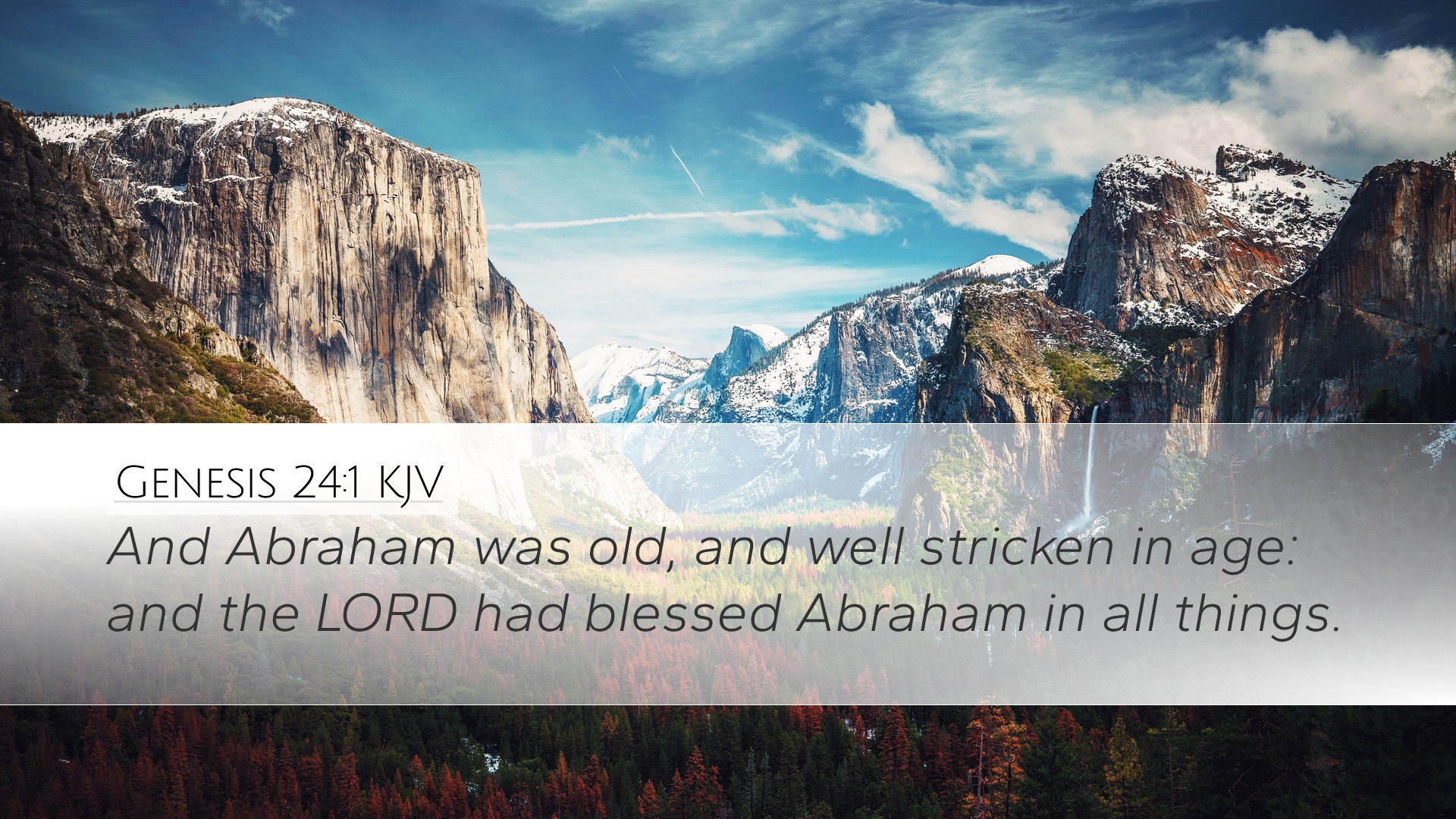Genesis 24:1 Commentary
Verse Overview: Genesis 24:1 states, "And Abraham was old, and well stricken in age; and the Lord had blessed Abraham in all things." This verse sets the stage for a pivotal moment in Abraham’s life as he is well into his years, reflecting on the blessings bestowed upon him and the future of his lineage.
Contextual Significance
Genesis 24 is the narrative of Abraham's efforts to secure a wife for his son Isaac. The verse emphasizes Abraham's old age, indicating that he is nearing the end of his life. This context is important for understanding the urgency and care with which he seeks a suitable spouse for Isaac. According to Matthew Henry, this concern illustrates a typical parental role, signifying the importance of lineage and covenant in the life of Abraham.
Interpretation of "Old and Well Stricken in Age"
Abraham's advanced age introduces themes of legacy and continuity. As noted by Albert Barnes, the phrase indicates not just physical aging but also a mature wisdom and insight that comes from a life well-lived. Abraham's advanced years symbolize the culmination of his spiritual journey, underscoring both his trials and triumphs in faith.
The Lord's Blessing
The declaration that "the Lord had blessed Abraham in all things" serves multiple functions:
- Divine Favor: This highlights God's covenantal faithfulness to Abraham. Adam Clarke illustrates how this blessing includes a rich array of spiritual and material aspects — children, wealth, and land, reinforcing His promises made in earlier chapters (Genesis 12:1-3).
- Encouragement for Believers: For pastors and theologians, this verse becomes a testimony of God's providence. It serves as a reminder that God's blessings may manifest in different forms and that faithfulness to God results in spiritual and material blessings.
- Call to Legacy: As Abraham contemplates his tribulations and triumphs, the blessings serve as a backdrop for the hope he invests in Isaac’s future. This legacy of faith is vital for believers, who are encouraged to reflect on God's workings in their own lives.
Theological Implications
This verse leads to critical theological reflections, especially in understanding God's sovereignty and human agency. Renowned scholars like Matthew Henry point out that even in old age, Abraham doesn’t passively accept his fate; instead, he actively seeks to maintain the covenant through diligent action in securing a wife for Isaac. Such actions resonate with the belief in a God who actively engages with human affairs.
Abraham's Diligence in Finding a Wife for Isaac
The context of this verse prompts readers to ponder the significance of marriage within biblical narratives. Abraham's meticulousness in choosing a spouse for Isaac reflects the serious approach to covenant relationships. Albert Barnes emphasizes that Abraham's insistence on finding a wife from his own people (Genesis 24:3-4) underscores a desire for fidelity to God's covenant, indicating the importance of shared faith in marital unions.
Application for Today
For contemporary application, this verse presents several key lessons:
- Seek God's Guidance: Just as Abraham sought divine guidance for Isaac’s future, believers are encouraged to seek God’s will in important life decisions, especially concerning relationships.
- Invest in Future Generations: The text highlights the significance of planning and foresight in spiritual matters, urging the church and families to invest in the faith journey of the next generation.
- Recognize God’s Blessings: Reflecting on one’s blessings, as Abraham did, can foster gratitude and remind believers of God's faithfulness throughout their lives.
Conclusion
Genesis 24:1 is not merely an introduction to a narrative; it is rich with implications for understanding God’s faithfulness and the human response to divine blessing. The insights gleaned from public domain commentaries provide profound theological and practical wisdom for pastors, students, theologians, and scholars. As they explore the implications of Abraham's age and the blessings received, they may find renewed inspiration to assess both their own lives and the covenant relationships they nurture.


